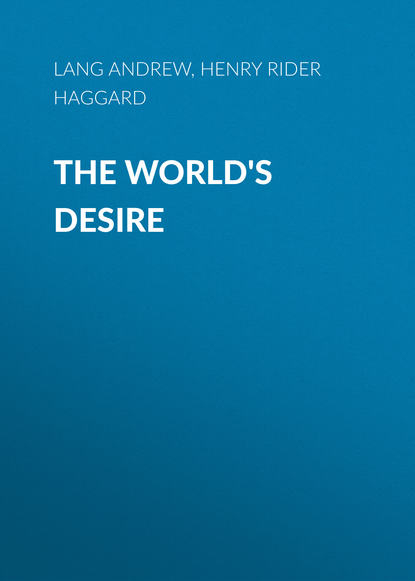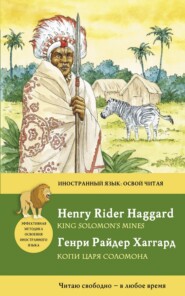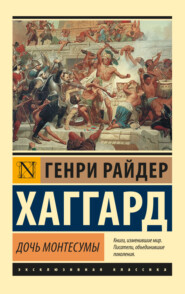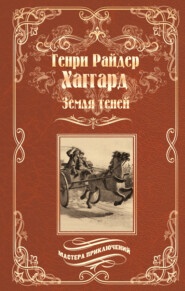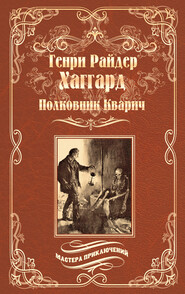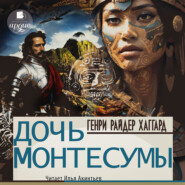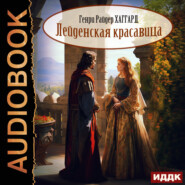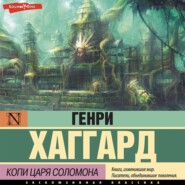По всем вопросам обращайтесь на: info@litportal.ru
(©) 2003-2024.
✖
The World's Desire
Настройки чтения
Размер шрифта
Высота строк
Поля
“I am minded to bid the soldiers shoot thee with arrows,” cried the captain in anger.
“So shall my wisdom sink in the sand with my blood, and be lost with my breath. Shoot on, thou fool.”
Now the captain was perplexed, for from the aspect of the man he deemed that he was sent by the Gods. He looked at the Wanderer, who took but little heed, or so it seemed. But in his crafty heart he knew that this was the best way to win speech with the man upon the camel. Then the captain took counsel with the captain of the horsemen, and in the end they said to the Wanderer:
“Descend from the chariot, lord, and walk twelve paces forward, and there hold speech with the man. But if thou go one pace further, then we will shoot thee and the man with arrows.” And this he cried out also to him who sat upon the camel.
Then the man on the camel descended and walked twelve paces forward, and the Wanderer descended also from the chariot and walked twelve paces forward, but as one who heeds little what he does. Now the two stood face to face, but out of earshot of the host, who watched them with arrows set upon the strings.
“Greetings, Odysseus of Ithaca, son of Laertes,” he said who was clothed in the beggar’s weeds.
The Wanderer looked upon him hard, and knew him through his disguise.
“Greeting, Rei the Priest, Commander of the Legion of Amen, Chief of the Treasury of Amen.”
“Rei the Priest I am indeed,” he answered, “the rest I am no more, for Meriamun the Queen has stripped me of my wealth and offices, because of thee, thou Wanderer, and the Immortal whose love thou hast won, and by whom thou hast dealt so ill. Hearken! I learned by arts known to me of the dream of Pharaoh, and of thy sending forth to do battle with the barbarians. Then I disguised myself as thou seest, and took the swiftest camel in Tanis, and am come hither by another way to meet thee. Now I would ask thee one thing. How came it that thou didst play the Immortal false that night? Knowest thou that she waited for thee there by the pylon gate? Ay, there I found her and led her to the Palace, and for that I am stripped of my rank and goods by Meriamun, and now the Lady of Beauty is returned to her shrine, grieving bitterly for thy faithlessness; though how she passed thither I know not.”
“Methought I heard her voice as those knaves bore me to my dungeon,” said the Wanderer. “And she deemed me faithless! Say, Rei, dost thou know the magic of Meriamun? Dost thou know how she won me to herself in the shape of Argive Helen?”
And then, in as few words as might be, he told Rei how he had been led away by the magic of Meriamun, how he who should have sworn by the Star had sworn by the Snake.
When Rei heard that the Wanderer had sworn by the Snake, he shuddered. “Now I know all,” he said. “Fear not, thou Wanderer, not on thee shall all the evil fall, nor on that Immortal whom thou dost love; the Snake that beguiled thee shall avenge thee also.”
“Rei,” the Wanderer said, “one thing I charge thee. I know that I go down to my death. Therefore I pray thee seek out her whom thou namest the Hathor and tell her all the tale of how I was betrayed. So shall I die happily. Tell her also that I crave her forgiveness and that I love her and her only.”
“This I will do if I may,” Rei answered. “And now the soldiers murmur and I must be gone. Listen, the might of the Nine-bow barbarians rolls up the eastern branch of Sihor. But one day’s march from On the mountains run down to the edge of the river, and those mountains are pierced by a rocky pass through which the foe will surely come. Set thou thy ambush there, Wanderer, there at Prosopis – so shalt thou smite them. Farewell. I will seek out the Hathor if in any way I can come at her, and tell her all. But of this I warn thee, the hour is big with Fate, and soon will spawn a monstrous birth. Strange visions of doom and death passed before mine eyes as I slept last night. Farewell!”
Then he went back to the camel and climbed it, and passing round the army vanished swiftly in a cloud of dust.
The Wanderer also went back to the host, where the captains murmured because of the halt, and mounted his chariot. But he would tell nothing of what the man had said to him, save that he was surely a messenger from the Under-world to instruct him in the waging of the war.
Then the chariot and the horsemen passed on again, till they came to the city of On, and found the host of Pharaoh gathering in the great walled space that is before the Temple of Ra. And there they pitched their camp hard by the great obelisks that stand at the inner gate, which Rei the architect fashioned by Thebes, and the divine Rameses Miamun set up to the glory of Ra for ever.
V THE VOICE OF THE DEAD
When Meriamun the Queen had watched the chariot of the Wanderer till it was lost in the dust of the desert, she passed down from the Palace roof to the solitude of her chamber.
Here she sat in her chamber till the darkness gathered, as the evil thoughts gathered in her heart, that was rent with love of him whom she had won but to lose. Things had gone ill with her, to little purpose she had sinned after such a fashion as may not be forgiven. Yet there was hope. He had sworn that he would wed her when Pharaoh was dead, and when Argive Helen had followed Pharaoh to the Shades. Should she shrink then from the deed of blood? Nay, from evil to evil she would go. She laid her hand upon the double-headed snake that wound her about, and spake into the gloom:
“Osiris waits thee, Meneptah – Osiris waits thee! The Shades of those who have died for thy love, Helen, are gathering at the gates. It shall be done. Pharaoh, thou diest to-night. To-morrow night, thou Goddess Helen, shall all thy tale be told. Man may not harm thee indeed, but shall fire refuse to kiss thy loveliness? Are there no women’s hands to light thy funeral pile?”
Then she rose, and calling her ladies, was attired in her most splendid robes, and caused the uraeus crown to be set upon her head, the snake circlet of power on her brow, the snake girdle of wisdom at her heart. And now she hid somewhat in her breast, and passed to the ante-chamber, where the Princes gathered for the feast.
Pharaoh looked up and saw her loveliness. So glorious she seemed in her royal beauty that his heart forgot its woes, and once again he loved her as he had done in years gone by, when she conquered him at the Game of Pieces, and he had cast his arms about her and she stabbed him.
She saw the look of love grow on his heavy face, and all her gathered hate rose in her breast, though she smiled gently with her lips and spake him fair.
They sat at the feast and Pharaoh drank. And ever as he drank she smiled upon him with her dark eyes and spake him words of gentlest meaning, till at length there was nothing he desired more than that they should be at one again.
Now the feast was done. They sat in the ante-chamber, for all were gone save Meneptah and Meriamun. Then he came to her and took her hand, looking into her eyes, nor did she say him nay.
There was a lute lying on a golden table, and there too, as it chanced, was a board for the Game of Pieces, with the dice, and the pieces themselves wrought in gold.
Pharaoh took up the gold king from the board and toyed with it in his hand. “Meriamun,” he said, “for these five years we have been apart, thou and I. Thy love I have lost, as a game is lost for one false move, or one throw of the dice; and our child is dead and our armies are scattered, and the barbarians come like flies when Sihor stirs within his banks. Love only is left to us, Meriamun.”
She looked at him not unkindly, as if sorrow and wrong had softened her heart also, but she did not speak.
“Can dead Love waken, Meriamun, and can angry Love forgive?”
She had lifted the lute and her fingers touched listlessly on the cords.
“Nay, I know not,” she said; “who knows? How did Pentaur sing of Love’s renewal, Pentaur the glorious minstrel of our father, Rameses Miamun?”
He laid the gold king on the board, and began listlessly to cast the dice. He threw the “Hathor” as it chanced, the lucky cast, two sixes, and a thought of better fortune came to him.
“How did the song run, Meriamun? It is many a year since I heard thee sing.”
She touched the lute lowly and sweetly, and then she sang. Her thoughts were of the Wanderer, but the King deemed that she thought of himself.
O joy of Love’s renewing,
Could Love be born again;
Relenting for thy rueing,
And pitying my pain:
O joy of Love’s awaking,
Could Love arise from sleep,
Forgiving our forsaking
The fields we would not reap!
Fleet, fleet we fly, pursuing
The Love that fled amain,
But will he list our wooing,
Or call we but in vain?
Ah! vain is all our wooing,
And all our prayers are vain,
Love listeth not our suing,
Love will not wake again.
“Will he not waken again?” said Pharaoh. “If two pray together, will Love refuse their prayer?”
“It might be so,” she said, “if two prayed together; for if they prayed, he would have heard already!”
“Meriamun,” said the Pharaoh eagerly, for he thought her heart was moved by pity and sorrow, “once thou didst win my crown at the Pieces, wilt thou play me for thy love?”
She thought for one moment, and then she said:
“Yes, I will play thee, my Lord, but my hand has lost its cunning, and it may well be that Meriamun shall lose again, as she has lost all. Let me set the Pieces, and bring wine for my lord.”
She set the Pieces, and crossing the room, she lifted a great cup of wine, and put it by Pharaoh’s hand. But he was so intent on the game that he did not drink.
“So shall my wisdom sink in the sand with my blood, and be lost with my breath. Shoot on, thou fool.”
Now the captain was perplexed, for from the aspect of the man he deemed that he was sent by the Gods. He looked at the Wanderer, who took but little heed, or so it seemed. But in his crafty heart he knew that this was the best way to win speech with the man upon the camel. Then the captain took counsel with the captain of the horsemen, and in the end they said to the Wanderer:
“Descend from the chariot, lord, and walk twelve paces forward, and there hold speech with the man. But if thou go one pace further, then we will shoot thee and the man with arrows.” And this he cried out also to him who sat upon the camel.
Then the man on the camel descended and walked twelve paces forward, and the Wanderer descended also from the chariot and walked twelve paces forward, but as one who heeds little what he does. Now the two stood face to face, but out of earshot of the host, who watched them with arrows set upon the strings.
“Greetings, Odysseus of Ithaca, son of Laertes,” he said who was clothed in the beggar’s weeds.
The Wanderer looked upon him hard, and knew him through his disguise.
“Greeting, Rei the Priest, Commander of the Legion of Amen, Chief of the Treasury of Amen.”
“Rei the Priest I am indeed,” he answered, “the rest I am no more, for Meriamun the Queen has stripped me of my wealth and offices, because of thee, thou Wanderer, and the Immortal whose love thou hast won, and by whom thou hast dealt so ill. Hearken! I learned by arts known to me of the dream of Pharaoh, and of thy sending forth to do battle with the barbarians. Then I disguised myself as thou seest, and took the swiftest camel in Tanis, and am come hither by another way to meet thee. Now I would ask thee one thing. How came it that thou didst play the Immortal false that night? Knowest thou that she waited for thee there by the pylon gate? Ay, there I found her and led her to the Palace, and for that I am stripped of my rank and goods by Meriamun, and now the Lady of Beauty is returned to her shrine, grieving bitterly for thy faithlessness; though how she passed thither I know not.”
“Methought I heard her voice as those knaves bore me to my dungeon,” said the Wanderer. “And she deemed me faithless! Say, Rei, dost thou know the magic of Meriamun? Dost thou know how she won me to herself in the shape of Argive Helen?”
And then, in as few words as might be, he told Rei how he had been led away by the magic of Meriamun, how he who should have sworn by the Star had sworn by the Snake.
When Rei heard that the Wanderer had sworn by the Snake, he shuddered. “Now I know all,” he said. “Fear not, thou Wanderer, not on thee shall all the evil fall, nor on that Immortal whom thou dost love; the Snake that beguiled thee shall avenge thee also.”
“Rei,” the Wanderer said, “one thing I charge thee. I know that I go down to my death. Therefore I pray thee seek out her whom thou namest the Hathor and tell her all the tale of how I was betrayed. So shall I die happily. Tell her also that I crave her forgiveness and that I love her and her only.”
“This I will do if I may,” Rei answered. “And now the soldiers murmur and I must be gone. Listen, the might of the Nine-bow barbarians rolls up the eastern branch of Sihor. But one day’s march from On the mountains run down to the edge of the river, and those mountains are pierced by a rocky pass through which the foe will surely come. Set thou thy ambush there, Wanderer, there at Prosopis – so shalt thou smite them. Farewell. I will seek out the Hathor if in any way I can come at her, and tell her all. But of this I warn thee, the hour is big with Fate, and soon will spawn a monstrous birth. Strange visions of doom and death passed before mine eyes as I slept last night. Farewell!”
Then he went back to the camel and climbed it, and passing round the army vanished swiftly in a cloud of dust.
The Wanderer also went back to the host, where the captains murmured because of the halt, and mounted his chariot. But he would tell nothing of what the man had said to him, save that he was surely a messenger from the Under-world to instruct him in the waging of the war.
Then the chariot and the horsemen passed on again, till they came to the city of On, and found the host of Pharaoh gathering in the great walled space that is before the Temple of Ra. And there they pitched their camp hard by the great obelisks that stand at the inner gate, which Rei the architect fashioned by Thebes, and the divine Rameses Miamun set up to the glory of Ra for ever.
V THE VOICE OF THE DEAD
When Meriamun the Queen had watched the chariot of the Wanderer till it was lost in the dust of the desert, she passed down from the Palace roof to the solitude of her chamber.
Here she sat in her chamber till the darkness gathered, as the evil thoughts gathered in her heart, that was rent with love of him whom she had won but to lose. Things had gone ill with her, to little purpose she had sinned after such a fashion as may not be forgiven. Yet there was hope. He had sworn that he would wed her when Pharaoh was dead, and when Argive Helen had followed Pharaoh to the Shades. Should she shrink then from the deed of blood? Nay, from evil to evil she would go. She laid her hand upon the double-headed snake that wound her about, and spake into the gloom:
“Osiris waits thee, Meneptah – Osiris waits thee! The Shades of those who have died for thy love, Helen, are gathering at the gates. It shall be done. Pharaoh, thou diest to-night. To-morrow night, thou Goddess Helen, shall all thy tale be told. Man may not harm thee indeed, but shall fire refuse to kiss thy loveliness? Are there no women’s hands to light thy funeral pile?”
Then she rose, and calling her ladies, was attired in her most splendid robes, and caused the uraeus crown to be set upon her head, the snake circlet of power on her brow, the snake girdle of wisdom at her heart. And now she hid somewhat in her breast, and passed to the ante-chamber, where the Princes gathered for the feast.
Pharaoh looked up and saw her loveliness. So glorious she seemed in her royal beauty that his heart forgot its woes, and once again he loved her as he had done in years gone by, when she conquered him at the Game of Pieces, and he had cast his arms about her and she stabbed him.
She saw the look of love grow on his heavy face, and all her gathered hate rose in her breast, though she smiled gently with her lips and spake him fair.
They sat at the feast and Pharaoh drank. And ever as he drank she smiled upon him with her dark eyes and spake him words of gentlest meaning, till at length there was nothing he desired more than that they should be at one again.
Now the feast was done. They sat in the ante-chamber, for all were gone save Meneptah and Meriamun. Then he came to her and took her hand, looking into her eyes, nor did she say him nay.
There was a lute lying on a golden table, and there too, as it chanced, was a board for the Game of Pieces, with the dice, and the pieces themselves wrought in gold.
Pharaoh took up the gold king from the board and toyed with it in his hand. “Meriamun,” he said, “for these five years we have been apart, thou and I. Thy love I have lost, as a game is lost for one false move, or one throw of the dice; and our child is dead and our armies are scattered, and the barbarians come like flies when Sihor stirs within his banks. Love only is left to us, Meriamun.”
She looked at him not unkindly, as if sorrow and wrong had softened her heart also, but she did not speak.
“Can dead Love waken, Meriamun, and can angry Love forgive?”
She had lifted the lute and her fingers touched listlessly on the cords.
“Nay, I know not,” she said; “who knows? How did Pentaur sing of Love’s renewal, Pentaur the glorious minstrel of our father, Rameses Miamun?”
He laid the gold king on the board, and began listlessly to cast the dice. He threw the “Hathor” as it chanced, the lucky cast, two sixes, and a thought of better fortune came to him.
“How did the song run, Meriamun? It is many a year since I heard thee sing.”
She touched the lute lowly and sweetly, and then she sang. Her thoughts were of the Wanderer, but the King deemed that she thought of himself.
O joy of Love’s renewing,
Could Love be born again;
Relenting for thy rueing,
And pitying my pain:
O joy of Love’s awaking,
Could Love arise from sleep,
Forgiving our forsaking
The fields we would not reap!
Fleet, fleet we fly, pursuing
The Love that fled amain,
But will he list our wooing,
Or call we but in vain?
Ah! vain is all our wooing,
And all our prayers are vain,
Love listeth not our suing,
Love will not wake again.
“Will he not waken again?” said Pharaoh. “If two pray together, will Love refuse their prayer?”
“It might be so,” she said, “if two prayed together; for if they prayed, he would have heard already!”
“Meriamun,” said the Pharaoh eagerly, for he thought her heart was moved by pity and sorrow, “once thou didst win my crown at the Pieces, wilt thou play me for thy love?”
She thought for one moment, and then she said:
“Yes, I will play thee, my Lord, but my hand has lost its cunning, and it may well be that Meriamun shall lose again, as she has lost all. Let me set the Pieces, and bring wine for my lord.”
She set the Pieces, and crossing the room, she lifted a great cup of wine, and put it by Pharaoh’s hand. But he was so intent on the game that he did not drink.





